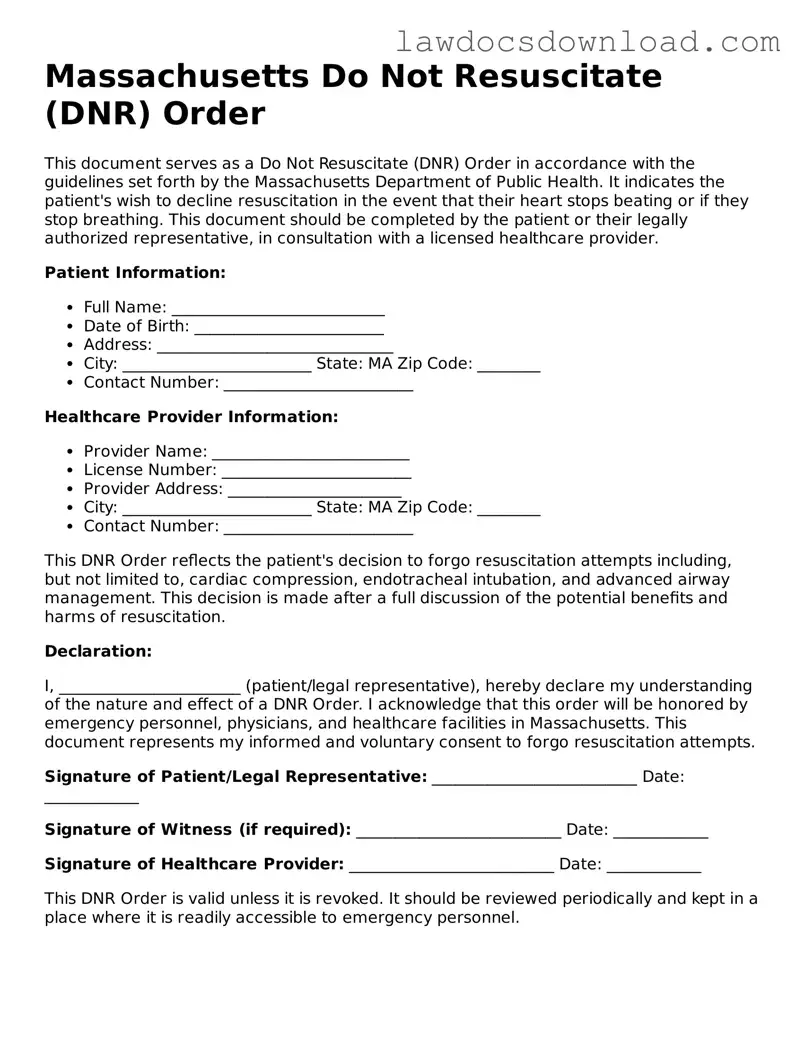A Massachusetts Do Not Resuscitate (DNR) Order shares similarities with a Living Will, as both documents guide healthcare professionals regarding a patient's preferences for medical treatment at the end of life. While a DNR specifically instructs healthcare teams not to perform CPR (cardiopulmonary resuscitation) if a patient's heart stops, a Living Will provides broader instructions about a variety of medical treatments and interventions the individual may or may not want, including but not limited to resuscitation.
The Healthcare Proxy is also akin to a DNR Order in that it enables an individual to outline their healthcare preferences. However, the focus of a Healthcare Proxy is to appoint someone else to make healthcare decisions on the individual's behalf if they become incapable of making decisions themselves. This contrasts with a DNR Order's specific direction regarding resuscitation efforts.
An Advance Directive is a broader term that encompasses various types of healthcare directives, including DNR Orders and Living Wills. An Advance Directive typically includes instructions about end-of-life care and may include the designation of a healthcare proxy. Thus, while an Advance Directive can cover a wide range of medical decisions and treatments, a DNR Order is specifically concerned with not initiating resuscitation procedures.
A Medical Order for Life-Sustaining Treatment (MOLST) is closely related to a DNR Order but is more comprehensive. A MOLST form is designed to communicate an individual's preferences for a range of life-sustaining treatments, including but not limited to CPR, intubation, and use of ventilators, at any stage of health, not just at the end-of-life. However, like a DNR, it is a doctor's order that is kept with the patient's medical records.
A Durable Power of Attorney for Healthcare, similar to a Healthcare Proxy, enables individuals to designate someone to make healthcare decisions on their behalf. However, it can encompass more general healthcare decisions beyond end-of-life care, such as consent to surgery or other treatments. In contrast, a DNR Order is a specific instruction against resuscitation attempts, without designating a decision-maker.
A POLST (Physician Orders for Life-Sustaining Treatment) form, much like a MOLST, offers a way for people to specify their wishes for end-of-life care, including their desires regarding CPR, ventilation, antibiotics, feeding tubes, and more, across various medical situations. Both POLST and DNR forms are designed to guide emergency medical personnel and healthcare teams in critical moments, but a POLST encompasses a broader range of medical interventions.
Lastly, an Emergency Medical Services (EMS) Do Not Resuscitate Order is specifically designed for emergency medical services personnel. It is similar to a hospital or standard DNR Order but applies when emergency medical professionals respond to a call at the individual's home or elsewhere outside of a hospital setting. This type of order signals to EMS personnel that the patient has chosen to forego resuscitation attempts in the event of cardiac arrest or respiratory failure, similar to a DNR, but is utilized in pre-hospital settings.

